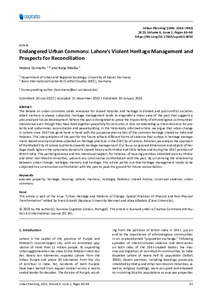| dc.date.accessioned | 2023-02-24T10:46:47Z | |
| dc.date.available | 2023-02-24T10:46:47Z | |
| dc.date.issued | 2023-01-30 | |
| dc.identifier | doi:10.17170/kobra-202302247543 | |
| dc.identifier.uri | http://hdl.handle.net/123456789/14442 | |
| dc.description.sponsorship | Gefördert durch den Publikationsfonds der Universität Kassel | |
| dc.language.iso | eng | |
| dc.rights | Namensnennung 4.0 International | * |
| dc.rights.uri | http://creativecommons.org/licenses/by/4.0/ | * |
| dc.subject | Lahore | eng |
| dc.subject | Pakistan | eng |
| dc.subject | shared history | eng |
| dc.subject | structural violence | eng |
| dc.subject | urban commons memory | eng |
| dc.subject | nostalgia | eng |
| dc.subject | evacuee property | eng |
| dc.subject | heritage housing | eng |
| dc.subject.ddc | 710 | |
| dc.title | Endangered Urban Commons: Lahore’s Violent Heritage Management and Prospects for Reconciliation | eng |
| dc.type | Aufsatz | |
| dcterms.abstract | The debate on urban commons yields relevance for shared histories and heritage in divided and post-conflict societies. Albeit memory is always subjective, heritage management tends to engender a linear view of the past that suggests a preconceived future development. Where the past is denigrated to prove the impossibility of ethnoreligious communities’ coexistence even though they have lived together peacefully for centuries, it risks corroborating us-them divisions for posterity and undermines reconciliation and peacebuilding. In this historically informed article, we argue that urban change in Lahore since 1947 has gone hand in hand with the purposive destruction of the common heritage shared by India and Pakistan. This interpretation of the past for the future reflects different forms of violence that surface in heritage management. Based on empirical data collected on heritage practices in the Old City of Lahore, Pakistan, we analyse the approach of the Walled City of Lahore Authority towards heritage management. Our focus on ignored dimensions and objects of heritage sheds light on the systematic denial of a shared history with Hindus and Sikhs before and during the 1947 partition of British India. This partial ignorance and the intentional neglect, for instance, of housing premises inhabited once by Hindus and other non-Muslim minorities, prevent any constructive confrontation with the past. By scrutinising the relationship between urban change, nostalgia, memory and heritage, this article points out that heritage management needs to be subjected to a constructive confrontation with the past to pave the ground for future reconciliation. | eng |
| dcterms.accessRights | open access | |
| dcterms.creator | Cermeño, Helena | |
| dcterms.creator | Mielke, Katja | |
| dcterms.extent | 83-98 | |
| dc.relation.doi | doi:10.17645/up.v8i1.6054 | |
| dc.subject.swd | Lahore | ger |
| dc.subject.swd | Pakistan | ger |
| dc.subject.swd | Öffentliches Gut | ger |
| dc.subject.swd | Kulturerbe | ger |
| dc.subject.swd | Wohnen | ger |
| dc.subject.swd | Denkmalpflege | ger |
| dc.subject.swd | Gefährdung | ger |
| dc.type.version | publishedVersion | |
| dcterms.source.identifier | eissn:2183-7635 | |
| dcterms.source.issue | Issue 1 | |
| dcterms.source.journal | Urban Planning | eng |
| dcterms.source.volume | Volume 8 | |
| kup.iskup | false | |


